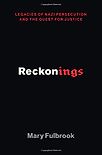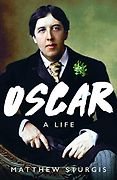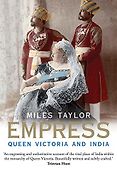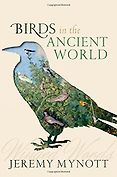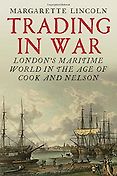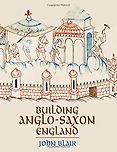You’ve been judging the Wolfson History Prize for a number of years now. How does the best history books of 2019 shortlist compare? Has it been a good year for history books?
It has been a very good year. What we noticed about the books that we the judges all agreed upon was just how varied they are. It’s a wonderful spread of subjects right across the board, from the ancient world to the present day. That’s very encouraging.
Another thing we liked was that two of our final choices were from outside the academic world. You’ve got one museum curator and one independent scholar who does it for the love of it. That tells you something about history: that it’s not just a tidy fit for what happens in academic history departments of great universities. It also involves people who’ve made themselves experts through their enthusiasm and their skill.
In terms of how you and the other judges decide which history books make the shortlist, I believe a book can’t just be a popularization of a subject. Even if you don’t have to be a professional historian to win the Wolfson History Prize, you do have to do original research. Is that right?
It’s very important that whoever is on our shortlist speaks with authority and that they’ve been on the coalface of writing history. They’ve been there with the documents, the primary sources—and yet they’ve got the flair to mediate that to a general public that isn’t necessarily interested in chasing up the footnotes. But the footnotes have to be there, as far as we’re concerned. They have to show that this person really knows what they’re talking about. Popularizing isn’t enough. That’s a genre of itself. It’s a very honourable sort of book, but it’s not going to cut the mustard with the Wolfson Prize.
As you mentioned a scholar outside academia who does it for the love of it, shall we start with his book? This is a new biography of Oscar Wilde by Matthew Sturgis and it’s called Oscar: A Life. It’s quite long, 700 plus pages, but it’s very readable.
I was surprised that a book could say anything new about Oscar Wilde, but it does. It’s just a wonderful all-round picture of this extraordinary, complicated man. It deals with his finances—which he was thinking about half the time and then not thinking about at all the other half of the time. But to understand his extraordinary explosion of creativity and then the terrible fall and all that came after, you’ve got to have an idea of how his genius made him money. I thought that was fascinating.
“I was surprised that a book could say anything new about Oscar Wilde, but it does”
The book goes well beyond the old Richard Ellmann biography, which for years seemed to be absolutely authoritative. It delved into his early life, which is fascinating. He came from this extraordinarily unusual family, which had its own share of scandal, and then made it from the Irish Protestant Ascendancy into an English world where he was clearly determined to be exotic.
Why do you think Oscar Wilde is an important figure to know about? Is that one of the Wolfson criteria, that the subject of the book has to be an important figure or subject?
I think the author has to demonstrate that it’s important. It’s always interesting when people show that a subject we hadn’t noticed is important.
Of course everyone knew about Oscar, and Oscar made sure that everyone knew about him. So the challenge of a book like this is illuminating a subject which we thought we all knew about.
Five Books interviews are expensive to produce. If you're enjoying this interview, please support us by donating a small amount.
The importance of Oscar Wilde is the writing at the middle of it. It’s the extraordinary brilliance of some of the best writing and the variety of it: The Happy Prince at one end, which makes you cry, and then The Importance of Being Earnest which you can laugh at, even if you’ve experienced the play again and again and again. Then there’s the way in which a great figure can be so self-destructive in a particular culture. All that seems to me to be hugely important.
Then there is his posthumous significance as a gay icon, but he’s really not a very good example, not someone you could quote to young gay men as the way to go. But, still, it tells you a huge amount about sexual attitudes of his time and ours.
In the preface to Oscar: A Life, Matthew Sturgis writes about why he felt there was a need for a new biography. He points out the danger, in some previous books, of the author being too seduced by what Oscar Wilde says about himself.
Yes. That’s one of the great arts of historical biography, that you have to get past the self-perception of the subject and also the self-presentation of the subject. Oscar was all self-presentation; the whole life was a huge performance. So Oscar: A Life is very good at taking a cool look at Wilde and revealing just how self-destructive he was and how destructive he could be to those around him.
Let’s go on to the next best history book 2019 which focuses on an individual. This is Empress: Queen Victoria and India by Miles Taylor, who is a professor of modern history at the University of York. He writes at the beginning that there has never been a full study of the British monarchy and India, which I was quite surprised to hear.
It’s often the way with the modern British monarchy, that people ignore it because they think it has no power. I think of Ben Pimlott’s wonderful life of Queen Elizabeth II: there was a Labour stalwart writing about a most unexpected figure and revealing just how important this impeccably discreet person was.
You might say that Queen Victoria was the first attempt at doing that as a constitutional monarch and that’s what Miles Taylor shows in Empress. He has got a feel for the way that apparently formal institutions, which don’t have real power, actually do.
Get the weekly Five Books newsletter
Queen Victoria took an enormous interest in India and had an instinct for how to brand it in a new way. In India the British monarchy was faced with scores of other monarchies, which needed to survive in this new uncharted territory of a British Empire. The queen was an extremely good way of integrating them into the Empire.
And she enjoyed it. Hugely. In India she found a world in which she had far fewer limitations than she did in Great Britain. That was partly because, as a British possession, India was feeling its way from a chaotic set of structures which the East India Company had built up. It gave her a stage on which to play which she wouldn’t otherwise have had.
The other thing he points out is that she was very popular in India. Though she never went there, she developed iconic status and was even embraced as a symbol by Indian nationalists, which you wouldn’t expect.
I suppose that’s because she happens to be a woman and therefore you can define her quite simply as the ‘mother,’ a role which she emphatically was biologically and which she loved to play. She looked the part. In many ways, it’s two needs finding each other: there’s the need of the queen to be assertive and there’s the need of India to make sense of what had happened to it.
Next let’s talk about the next 2019 history book, Birds in the Ancient World by Jeremy Mynott, who is both a classical scholar—he has translated Thucydides—and an avid birdwatcher.
This is a wonderful book. I opened it thinking, ‘Oh dear. I’m not that interested in birds. Will I get anything out of this? Is it the work of an engaging eccentric?’ But I was drawn in by it so quickly. There’s a certain randomness about it, which is the randomness of ornithology, I suppose.
It’s the sheer learning of it which is so engaging. It’s extremely learned in a field—natural history—where not all that many people are learned in this particular way. What particularly impressed me was the accomplished translations of classical literature. They’re all Mynott’s translations and they’re so idiomatic, so elegant. Then there is the wit and the beautiful illustrations. There are so many things to like about this book and it looks great. It tells you about ancient people as well as ancient birds.
It’s this wonderful journey through classical literature by way of birds. You learn about poems and lots of other kinds of writings—he even mentions the first science fiction story ever written. You get a real sense of that opus of work by looking at it through this one prism.
Exactly. Here’s a perspective on the ancient world which I wouldn’t have thought of and you wouldn’t think would be a coherent theme, but it is. And that was rather cheering, really. It’s taking a relationship between humanity and the natural world and illuminating the cheering side of human and animal relations.
What do you make of birds being thought of as omens and signs by the ancients?
What it demonstrated to me was just how different human mindsets can be across time. It’s by no means the first thing we think about now—though I still worry if I only see one magpie first thing in the morning. So, that does slightly unite that world and this.
“The ancient world was silent relative to ours because there was no background hum of engines—but there was a far greater roar of animals and bird noises around”
But priorities have so radically shifted. Now we regard birds as signs of the damage that we’re doing to nature by their diminution in numbers. The worries when the sparrows disappeared from Trafalgar Square, for instance. It’s a different sort of sign now, but we’re still keeping our eye on them, because it tells us about us when we look at birds in a certain way.
He opens the book talking about how nightingales could be heard singing in the suburbs of Athens and Rome and how birds populated the landscape in an abundance and variety we can scarcely imagine. That was quite an image.
It was, wasn’t it? The ancient world was silent relative to ours because there was no background hum of engines—but there was a far greater roar of animals and bird noises around.
Let’s move on to the next 2019 history book which is Reckonings: Legacies of Nazi Persecution and the Quest for Justice. This is by Mary Fulbrook, a professor of German history at UCL and a huge name in this field. It’s another big book: over 500 pages. Tell me why it’s made the Wolfson shortlist and what you like about it.
There are so many books about the Nazis and the Holocaust. Mary Fulbrook clearly is one of the great names in the period but I opened the book with a gloomy expectation. What new could be said? The first part of the book is wonderfully done, but we’ve heard the story before.
Five Books interviews are expensive to produce. If you're enjoying this interview, please support us by donating a small amount.
What makes the book distinctive is the second half: the way that she pursues what happened to victims and perpetrators in the years after 1945. She tells different stories: the story of the Federal Republic of Germany, and the story of the DDR, the German Democratic Republic, and the way in which reactions to the Holocaust contrasted in these settings and the reasons for that—the political configurations after 1945 and the Cold War. All of that is absolutely fascinating and not just at the political level. She pursues individuals into their evasions, their proclamations, their quests for justice, their acceptance of the awfulness of the past, their denials. That makes the book really stand out in a vast literature.
She’s really shocked by what she what finds, isn’t she?
It’s a very personal book and it gives the lie to the idea that historians are free of bias and ought to be. We shouldn’t. We have attitudes to things and we make moral judgments. This is a book which emphatically makes moral judgments—perhaps easier to do in circumstances of such horror—but that’s what gives it a compelling quality. How could you tell this story in a neutral fashion?
I did feel it was harsh on the Germans in the sense that they are dealing with the horrors of World War II more than (say) the Japanese are.
True—that’s another book—but it’s also not true, because there is so much denial, there is so much evasion, even now, alongside much honourable reassessing of the past.
You’re also drawn into wondering how it would have been if it had been us. We would have been no better and we might have been worse. Given the present illusions of many British people about World War II in relation to Brexit, I don’t think that Germany comes off too badly in this book.
Let’s go on to Trading in War: London’s Maritime World in the Age of Cook and Nelson. This 2019 history book is by Margarette Lincoln, who was deputy director of the National Maritime Museum in Greenwich.
What surprised me with so many of the books on the shortlist was how much I enjoyed them, even when they were about subjects that I don’t naturally warm to—like ships and shipping, which bore me rigid. But when I opened this book, I became absolutely fascinated and drawn in by it, because it appealed to a positive obsession of mine, which is local history. This is supremely clever local history, magnified as a prism to look at national and global history.
She bounded it in a very interesting way. Physically it’s bounded because it’s about an area of East London which had grown up with one function in mind, which was to serve a great overseas trade. She’s also describing a well bounded period, both in national history and in local history, from the 18th century—when Britain became a real global power—to the early 19th century, when a new British Empire was about to be developed. In the 1820s and 30s a vast enterprise of building new docks happened in East London which completely transformed the area, literally gouging bits out of it. Historic buildings were demolished in order to create docks.
This was all happening while the Revolutionary Wars were going on, first trying to stop the American colonies from becoming independent and then the fight against Napoleon. Is war an important part of the book, as the title suggests?
Very much so: war seen at a distance and the effects of war. It also reminds one rather depressingly of the stimulus that war gives to trade and the money to be made out of war by all sorts of levels of people: not just arms profiteers, but ordinary people keeping pubs in Rotherhithe.
It’s also about the extraordinarily varied nature of trade in 18th century Britain.
I saw the author, Margarette Lincoln, at a talk and she pointed out that in those days the River Thames was busier than the M25 at rush hour.
It’s a very crowded world, isn’t it? It’s crowded on the water and it’s crowded on the edges of the water. It was a world feeling its way to how to cope with this extraordinary concentration of people, who were so ill defined and so multifarious in nature. But in the book there is also the reassuring sense that despite all the apparent chaos, 18th century administrators and local officials could just about manage it all. It was no more chaotic and sleazy than modern London.
“18th century London was no more chaotic and sleazy than modern London”
That’s one of the fascinations of the book, that it’s very, very high-class local history—that knows every street, that understands the way buildings functioned—and yet looks at the wider implications of all that.
Last but not least we have a book called Building Anglo-Saxon England by John Blair. Tell my why you liked it.
What I like particularly is the way in which history and archaeology and landscape history all came together to tell us so many new things about Anglo-Saxon England. I was very pleased that we could include this book, because it’s not natural territory for the Wolfson Prize. It’s difficult to make Anglo-Saxon England come to life, but this book does because it’s got such an eye and an ear for what remains. For instance, the book takes place names which are familiar to us, like Burton, which you hear all over England. You wonder, ‘Why are we hearing this name Burton all over the place?’ John Blair makes sense of it. He takes us back to a world in which it had a particular function. I thought that was tremendous.
Get the weekly Five Books newsletter
I’m an archaeology fan, and a nerd for churches, and all that was in there and yet there is a sharp political focus as well. The future of England was not Mercia, it turned out to be Wessex and yet the big historic, political hero of the book is the kingdom of Mercia. Mercia has been lost to obscurity because the archive was lost. We have very few documents. But what we do have is the landscape—and also extraordinary things like the Staffordshire Hoard—to remind us that this was once the future of what might have become something other than England.
John Blair is a professor of medieval history as well as archaeology at the University of Oxford, so it combines the two disciplines?
Yes, he is straddling two worlds which don’t always talk to each other properly. Historians often despise archaeologists and can’t understand what they’re on about and archaeologists sometimes are not good at keeping up with the way that documentary history has gone, though I think that’s less true than the other way around. This is a wonderful example of how you do both and that there’s no gap between them: when there aren’t documents you just go to the archaeological record.
He says that there is no such thing as ‘Anglo-Saxon England.’ Not knowing much about that period, what does that mean?
It means that identities were being created which, in the end, created something which you can call England. But if you had no hindsight, that’s not where you might expect it to go. That’s what I mean by Mercia being a future which didn’t happen. It was Wessex, but it could have been Merica—in which case we’d have had something which wasn’t England. It might have been some entity whose headquarters was Birmingham or Tamworth forever. And we’d have had a greater Tamworth instead of a greater London.
Read more in the best books of 2019 interview series.
Five Books aims to keep its book recommendations and interviews up to date. If you are the interviewee and would like to update your choice of books (or even just what you say about them) please email us at [email protected]

